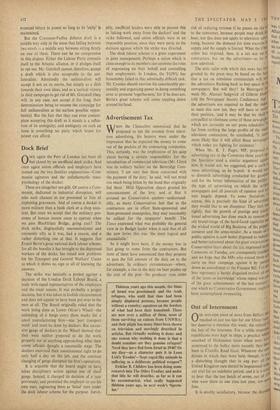Dock Brief
ONCE again the Port of London has been all but closed by an unofficial dock strike. And once again union officials and employers have trotted out the two familiar explanations—Com- munist agitators and the unfathomable mass- psychology of the docker.
These are altogether too glib. Of course a Com- munist, dedicated to industrial disruption, will take such chances as are presented to him of exploiting grievances. And of course a docker is more militant than a bank clerk or a shop assis- tant. But must we accept that the ordinary pro- cesses of human reason cease to operate when we pass Blackfriars Bridge, going east? The dock strike, disgracefully unconstitutional and eminently silly as it was, had a reason, and a rather disturbing one at that. It suggests that Ernest Bevin's great national dock labour scheme, for all the benefits it has brought to the depressed workers of the docks, has raised new problems for his Transport and General Workers' Union to which it shows no sign at all of knowing the answers.
The strike was basically a protest against a decision of the London Dock Labour Board, a body with equal representatives of the employers and the trade unions. It was probably a proper decision, but it was taken in foolish circumstances and does not appear to have been put over to the men at all. The Board originally ruled that the work being done at Lower Oliver's Wharf—the unloading of a barge every three weeks for a small manufacturing firm—was 'port transport work' and must be done by dockers. But succes- sive gangs of dockers at the Wharf showed that they were neither prepared to do the work properly nor at anything approaching what their union officials ttbought a reasonable wage. The dockers exercised their constitutional right to do only half a day on the job, and the constant changing of gangs disrupted the firm's operations. It is arguable that the board ought to have taken disciplinary action against one of these gangs. Instead, it changed its decision of a year previously, and permitted the employer to use his own men, registering them as 'listed' men under the dock labour scheme for the purpose. Inevit- ably, unofficial leaders were able to present this as 'taking work away from the dockers' and the strike followed; and union officials were in an impossible position, since they were party to the decision against which the strike was directed. The dock labour scheme is a great experiment in joint management. Perhaps a union which is close enough to its members can combine the roles of negotiating on their behalf and controlling their employment. In London, the TGWU has lamentably failed in that admittedly difficult task. Mr. Cousins should exercise his considerable per- sonality and organising power in doing something soon to promote 'togetherness,' for if he does not, Bevin's great scheme will come toppling down around his head.






































 Previous page
Previous page